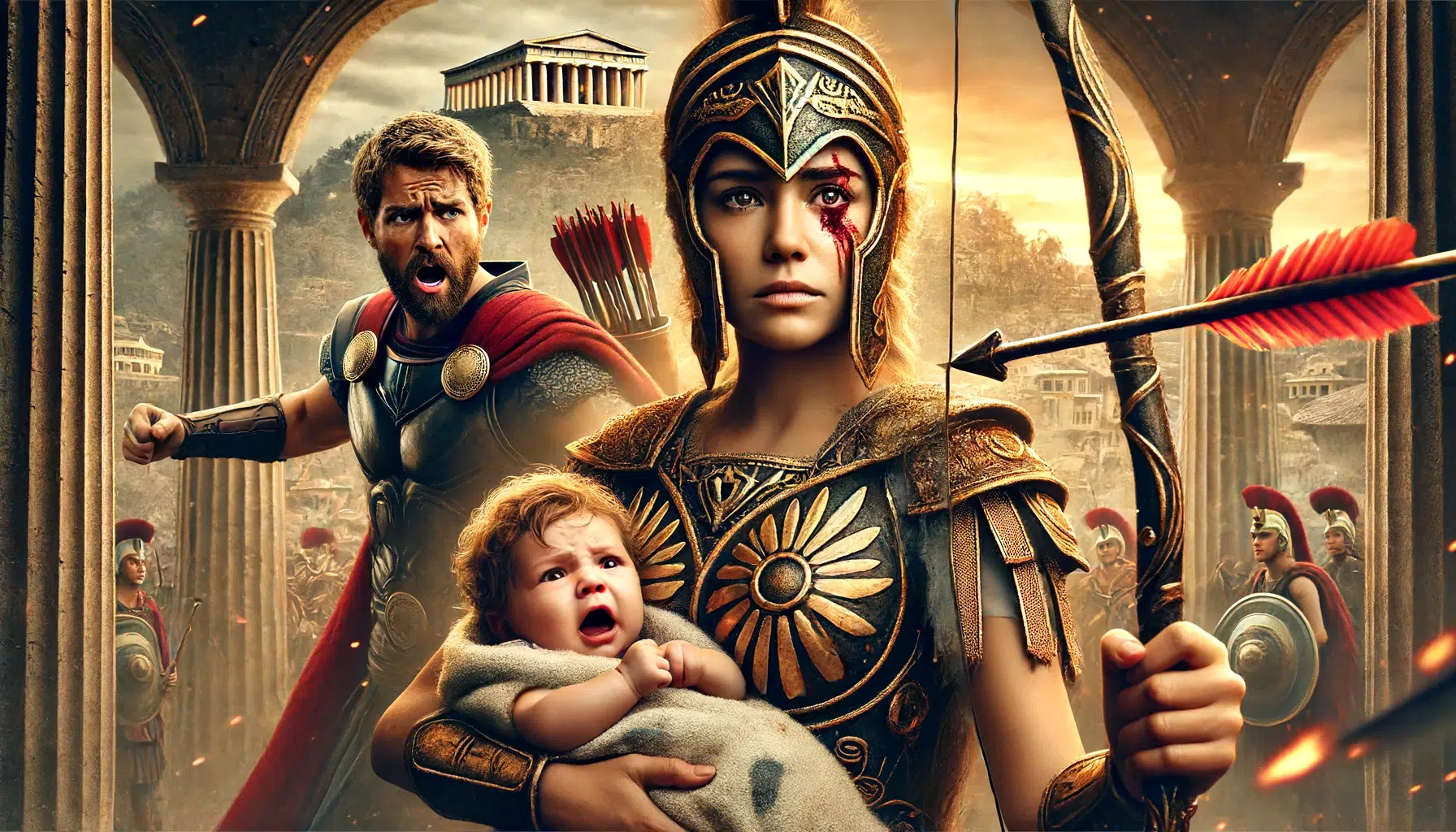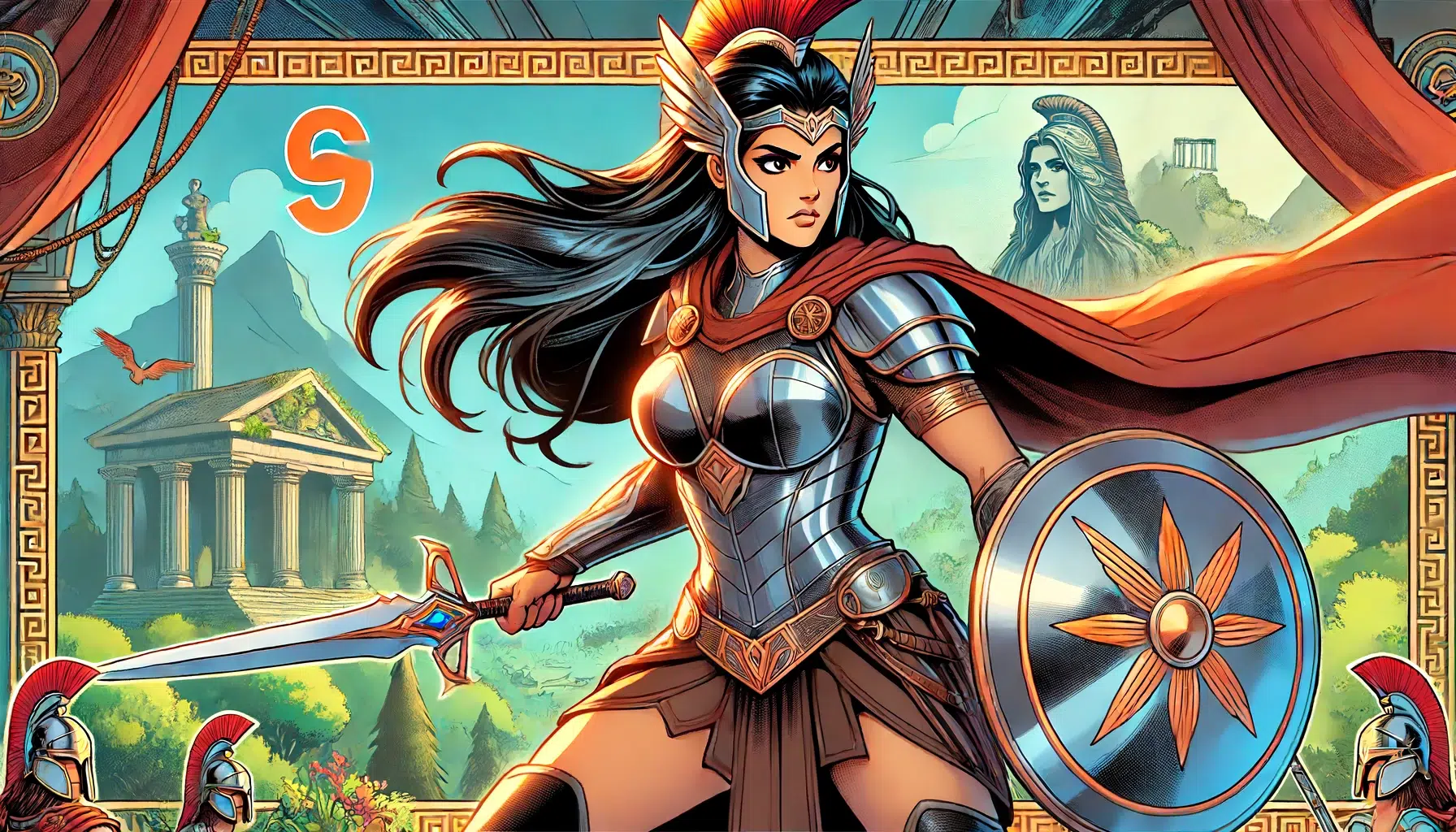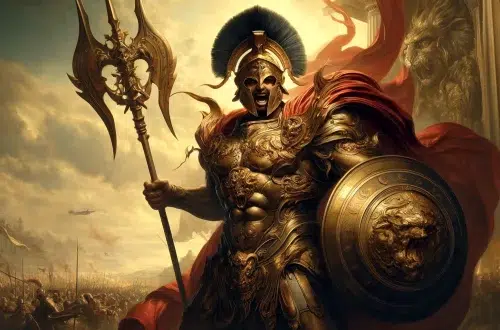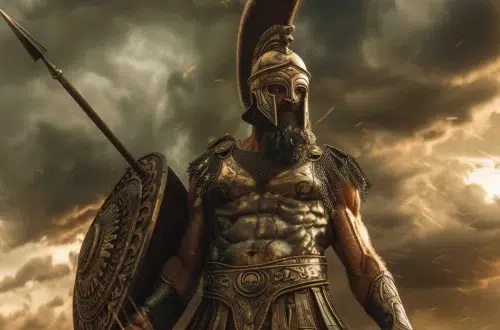
Antiope: Amazon Warrior & Daughter of Ares
Antiope is a famous character from Greek mythology, and is a powerful Amazon, the fierce female warriors.
The Amazons are legendary for their skills in combat and their courage. They live without men and create a society ruled entirely by women.
Her name comes from the Greek words for “like or against” and “voice.” She’s known by different names in various cultures, because of the various myths that tell about her role in ancient times.
Antiope myths connect her with some famous Greek mythology figures like Theseus and Zeus.
Antiope’s Family

Antiope is the daughter of Ares, the God of War, which explains her incredible fighting abilities and strong leadership qualities.
Her mother Otrera was the founder and first Queen of the Amazons. This makes Antiope royalty in her world.
Her family background emphasizes strength, independence, and bravery. The Amazons support one another and value freedom highly.
Antiope grows up in this environment, learning how to fight and lead from a young age. Her skills and her heritage make her a respected leader among the Amazons.
She inspires many stories and adventures, including her encounters with famous Greek heroes.
Antiope’s Sisters

Antiope has three sisters, each remarkable in their own right.
One of her well-known sisters is Hippolyta, who also rules as an Amazon queen. Hippolyta is famously known for owning a magical girdle, a gift from her father, Ares, the god of war.
This girdle becomes a central element in one of her most famous myths.
Hercules is tasked with obtaining it as one of his twelve labors.
Hippolyta’s encounters with other legendary figures, including Theseus, further illustrate her role in various heroic tales.
Another sister, Melanippe, an Amazon warrior, excels in wisdom and bravery.
Melanippe is celebrated for her intellect and philosophical insight, which she uses to educate or counsel her fellow Amazons.
One notable narrative involves her being captured and forced to reveal the secret location of sacred Amazonian objects to secure her freedom.
Melanippe’s character embodies the Amazonian values of strength, wisdom, and loyalty.

Penthesilea, also a queen of the Amazons, is celebrated for her extraordinary bravery and skill in battle. Penthesilea’s most famous story centers on the Trojan War, where she comes to the aid of the Trojans after the death of Hector.
Her presence in the war is marked by a tragic encounter with Achilles, who ultimately kills her in combat. Her character represents the Amazonian ideals of valour, honour, and the struggle of warrior women in a male-dominated arena.
Together, these sisters embody the Amazon ideals of strength, courage, and sisterhood.
They support and protect each other, always ready for any challenge.
Learn more about Antiope’s Family:
- Ares Quick Tempered Greek God of War
- Hippolyta: Queen of the Amazons in Greek Mythology
- Penthesilea: Amazon Queen Who Died in Trojan War
Antiope and Theseus

Antiope is known for her connection with Theseus, a famous hero of Greek mythology. Theseus is the son of Aegeus, the king of Athens, and Aethra. He is known for his bravery, strength, and intelligence.
Theseus becomes famous for his journey to Athens, during which he defeats many dangerous foes, including the bandit Procrustes. He also plays a key role in unifying the region of Attica under Athenian rule, establishing Athens as a powerful city-state.
His adventures and deeds make him one of the greatest heroes in Greek mythology. In the most well known myths, Theseus encounters Antiope. He either abducts her or she falls in love with him and leaves with him willingly.
The stories vary in different versions of the myth.
Antiope and Theseus would marry, and they have a son named Hippolytus.
Euripides Play: Hippolytus (428 BC)
The playwriter Euripides would produce nine plays based on events according to official Athenian records.
Euripides states in his play that Hippolytus mother is Antiope’s sister, Hippolyta. Many plays and Greek literature would change some characters for a more dramatic effect.
Hippolytus grows up to be a respected prince, known for his chastity and his devotion to the goddess Artemis.
Antiope’s marriage to Theseus and her motherhood to Hippolytus add complex layers to her character.
The Confusing Myths of Antiope

The stories of Antiope, like those of many mythological figures, were subject to numerous reinterpretations.
This would depend on the cultural, social, and political contexts of the time.
Antiope’s various stories can be seen as reflections on women’s roles, heroism, and the consequences of war.
Two Different Women Named Antiope
Could the reason for such different myths about Antiope be that they are based on two different women during that time?
Different regions often had their own versions of a myth to reflect local values, geographic landmarks, or historical events.
Some Greek literature would even add or change characters to add to the drama of the works.
Perhaps they were two different women.
- Antiope of the Amazons – the legendary queen of women warriors
- Myths about the Amazons include:
- Antiope and the Capture by Theseus
- Antiope and the Attica War
- Death of Antiop
- Myths about the Amazons include:
- Antiope of Thebes – princess and daughter of Nycteus, the king of Thebes
- Myths about the princess include:
- Seduced by Zeus
- Birth of Twins
- The Madness of Antriope
- The Death of Dirce
- Myths about the princess include:
Others also had the name Antiope and appear in Greek Mythology and literature.
- Antiope is one of the 50 Nereids – the name of one of the Nereids, nymph-daughters of the sea god Nereus and Doris.
- Antiope is the wife of Echetus – Echetus is a notoriously cruel king in Homer’s “Odyssey.”
These references suggest that there could be more than one character, thus more myths, going by the name of Antiope.
Antiope of Thebes

Another heroine in Greek mythology with a different background and story is Antiope of Thebes. Her story differs greatly from that of Antiope, the great Amazon queen, suggesting that they are two different people.
Antiope’s story touches on themes of divine interaction, motherhood, vengeance and justice. This character and her stories appear in many Greek art pieces and classical literature.
She is often associated with the dramatic and tragic elements of the myths surrounding her life.
Her Capture by Theseus

Theseus is a hero known for his daring deeds and adventures. One of his lesser-known stories involves Antiope, an Amazon queen.
One popular version describes that Theseus encounters Antiope during an Amazonomachy, which is a mythical battle between the Greeks and the Amazons.
In this account, Theseus may have accompanied Hercules during his 9th Labor to the Amazon land.
Hercules was tasked to retrieve the war belt or girdle from Hippolyta.
During this encounter, Theseus either captures Antiope or she is taken during the chaos of battle.
Another version explores a more romantic side suggesting Antiope meets Theseus and falls in love with him.
In this narrative, Antiope is either captivated by his bravery and heroism or there is a mutual attraction when their paths cross.
This story says Antiope willingly leaves with Theseus, either due to love or a strategic choice to foster peace between the Amazons and Athens.
Regardless of how it begins, Antiope accompanies Theseus back to Athens.
She adapts to life in Athens and even marries Theseus. Together, they have a son named Hippolytus, who grows up to be a respected figure.
The Amazons, loyal to their queen and angered by the abduction, decide to invade Athens.
They gather a large army and sail to Athens.
This invasion is known as the Attic War. It causes much chaos and fighting in Athens as the Amazons try to rescue Antiope.
Despite the war, Antiope stays with Theseus and her son.
Antiope and The Attic War

The Attic War is a major battle that erupts after Theseus brings Antiope, the Amazon queen, to Athens.
Feeling betrayed and angry, they decide to invade Athens to get Antiope back. This shows their strong loyalty and fierce determination.
The Amazons, led by Queen Penthesilea, sail to Athens aiming to free Antiope from Theseus.
They fight bravely and fiercely, showing great skill and strength.
The people of Athens are surprised by the sudden attack and struggle to defend their city.
The streets of Athens turn into a battlefield as both sides fight with all their might.
Theseus leads the Athenians in defending their city.
He knows the Amazons are tough opponents because of their excellent fighting skills.
The war becomes intense, with both sides experiencing losses.
As the war continues, Antiope faces a tough decision. She has strong ties to her Amazon family but also has grown to care for Theseus and her new life in Athens.
After much conflict, she chooses to stay in Athens with Theseus, hoping to build a bridge of peace between the Amazons and Athenians.
Her choice adds tension to the war, as her fellow Amazons feel betrayed.
Eventually, both sides realize the heavy cost of the war and decide to stop fighting and seek peace.
The Amazons, seeing Antiope’s choice, feel a mix of betrayal and sadness. However, they respect her decision.
The end of the Attic War marks a time of healing and rebuilding for both Athens and the Amazons.
The war would last four months, but end in tragedy.
Antiope’s Death

Antiope’s death is a tragic part of her story.
After the Attic War and her decision to stay in Athens with Theseus, tensions remain high.
Some versions of the myth say that during a conflict, Molpadia, an Amazon, accidentally kills Antiope.
This often happens in the heat of a battle or during an uprising against Theseus.
In another version, Antiope dies protecting Theseus or her son, Hippolytus.
She shows her bravery one last time by jumping into harm’s way to save someone she loves.
This act of heroism highlights her courage and loyalty, qualities that define her as an Amazon and a queen.
Her death affects those around her deeply, especially Theseus and Hippolytus.
They feel a great loss because Antiope is not just a queen or a warrior, but also a loved one.
Her death reminds everyone of the high cost of conflict and the importance of peace.
The legend wraps up with a peace treaty at Horeomosium, close to Theseus’s temple.
Antiope’s Legacy in Modern Pop Culture

Antiope, a figure from ancient myths, now shines in our modern world.
She is most known as an Amazon warrior.
In the Wonder Woman series by DC Comics, Antiope is shown as a strong fighter and mentor.
This makes her a symbol for women’s empowerment. Her role in the series has made her a beloved feminist icon.
Antiope’s courage and strength captivate audiences today.
She brings a message of empowerment and resilience.
Her story aligns with the fight for women’s rights, making her an even more powerful figure.
Thanks to new films and shows, Antiope’s legend stays alive in our minds.
Films and shows about her are not just about the past. They also connect her story to our current values.
They give us a different look at Antiope’s tale, with a focus on today’s important issues.
This keeps her impact strong and relevant in today’s world of stories and legends.
Impact of Antiope on Feminist Ideals
Antiope’s story shows the strength of women through history.
She was born with divine skills and powerful siblings. They showed women could lead and fight in Amazonian society.
Her famous love story with Theseus led to a big fight called the Amazonomachy.
This war challenged Greek myths by showing women fighting as equals. It made Antiope a key symbol of going against male-dominated norms.
Antiope’s influence goes deep into our culture, from old tales to modern feminist talks.
Her role in “Wonder Woman” by Robin Wright still inspires us today.
It shows her as a figure of power and freedom, connecting history with our current goals.
Near the Black Sea, archaeologists found proof of Amazons, adding fact to the myth.
These discoveries underline how power was shared more equally between men and women back then.
This matches with what many feminists aim for now.
“Wonder Woman,” made by Patty Jenkins, brings Antiope’s story to life with a diverse group of Amazons.
It mixes the goals of war and peace in a feminist light. Though some disagree, the movie helps keep Antiope’s message alive.
Antiope remains a powerful symbol in the fight for gender fairness.
Her legend keeps challenging and motivating, showing the true power of women across time.
Learn more about:
- God of Archery: Norse, Greek & Roman Mythology
- Gods and Archery in Greek Mythology Books
- Legacy of Archers: Women in Greek Mythology
Conclusion
Antiope, the Amazon Queen, is a symbol of strength and courage.
She leads her warriors with bravery and wisdom. Antiope shows that women can be powerful leaders and fierce fighters.
Her story inspires many to stand up for what is right and just. She faces many challenges but never loses her determination.
Antiope’s leadership and skills in battle make her a respected and legendary figure.
Her legacy teaches the importance of bravery, resilience, and leadership.
People remember Antiope as a true Amazon Queen who embodies the spirit of a warrior and a leader.
Her story remains an example of strength and honour.




